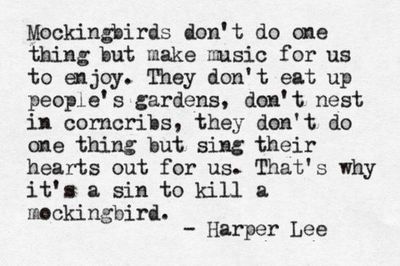In her masterpiece of a novel, To Kill a Mockingbird, Harper Lee made it quite clear that killing a mockingbird is a sin. It's the central motif/theme of the story and, as you can quite easily guess, is the reason for her title.
 |
| Further explanations not necessary. |
Only by remote association do I place Harper Lee in the same category. She may not be the dirty underhanded coyote Ewell is, but she did (symbolically, of course) commit the same crime. Yes, Harper Lee has killed herself a mockingbird. By which I mean, she decided to reach into the far past after declaring she would not publish another book and pull out Go Set a Watchman--essentially a rough draft of To Kill a Mockingbird.
While I suppose that's a whole lot better than having her laundry list published, which was a very slight possibility in the afterglow of her novel's fantastic success, it holds a massive disregard for her earlier work and those involved in making it "our national novel" (Oprah Winfrey). Chief mockingbird sinned against is Tay Hohoff, the editor who took Harper Lee under her wing and helped transform her original manuscript (Watchman) into an unquestionable work of art (Mockingbird). This could be construed as an insult to her editor, and possibly says that she didn't need any "interference" in her work.
 |
| How am I supposed to tell them I killed a mockingbird? |
For one thing, Watchman is a tale of disillusionment, and those are a dime a dozen, Unless you happen to be one of them lucky mockingbirds, you will be disillusioned at some point in your life. That doesn't mean the story should be published.
Lastly, another mockingbird who fell victim to the new novel's release is Ms. Lee herself. She went back on her declarations of not publishing anything and sold out. One has to think a greedy agent convinced her it was a good idea. The name, Harper Lee, would guarantee sales (and sold it has).
The question needs to be asked. Was it worth it?
No comments:
Post a Comment